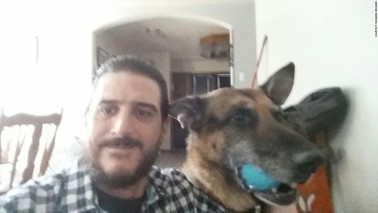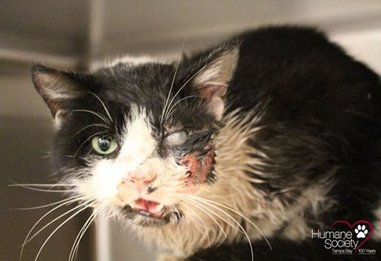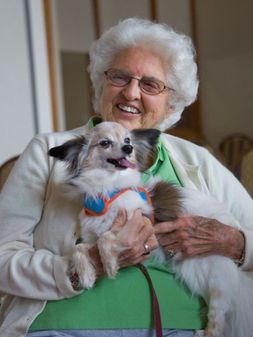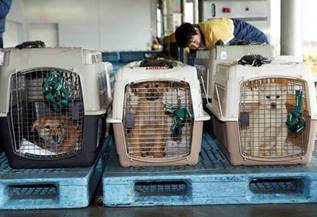 (CNN) Deciding to move on after his beloved German shepherd was stolen from his backyard 18 months ago wasn't easy for Richard Brower. "I never gave up hope," Brower said, "I'd just come to the realization that I couldn't go on without another dog." He'd enlisted the help of his motorcycle-riding buddies and nearly everyone from the dog park in the search. Anyone seen walking a German shepherd had been, at one time, accosted by him or his friends. His searches were fruitless. "It was heartbreaking," Brower said. "Absolutely horrible." His heart-wrenching decision to search for a new dog -- made after a year-and-a-half of endless searching for Dozer -- turned out to be the best decision he could've made, as it led him back to his best friend in a miraculous way. After returning home 18 months after he was stolen, Dozer is now a celebrity at the dog park. EXPAND IMAGE "It's the closest thing to a miracle in my life," he said. Brower typed "German shepherds for sale" into an Internet browser, which led him first to Claresholm Animal Rescue Society. He clicked the link and shivers went down his spine. "My heart stopped," Brower said, "the second I opened the page." Staring back at him on the rescue's website was his dog, Dozer, the pup's head cocked to the side, just as he remembered. Brower said he never doubted that it was his dog, but he sent the picture to his mom and sister for their opinion. His sister agreed it was Dozer, but his mom was doubtful. Brower said she was likely trying to save her son from unnecessary heartbreak, in case it wasn't him. Brower called the shelter and reached Sylvia Giroux at Claresholm, Alberta. While on the phone, Brower's dad, returning home from a business trip, stopped at the shelter, unbeknownst to his son. Brower said Dozer immediately started wagging his tail when his father came into the room. Still on the phone, Brower instructed his dad to snap his fingers once and then tell him what the dog did. He snapped and Dozer, a super well-trained dog who knows how to open and close doors and turn on lights, circled Brower's dad and sat on his right hand side, waiting for his next command. "There was no boo-hooing, but it was close," Giroux said, "It was just such a wonderful thing." Giroux might've kept it together, but Brower said everyone else was a different story. "My dad was bawling, I was bawling on the phone," he said. And when Dozer got home -- there was more crying -- from Dozer. "He almost knocked me over," Brower said. "He came flying in, put his head into my arm and started doing that wailing that German shepherds do." Other than his having lived at the shelter for a month after he was picked up by a resident nearby, Brower doesn't know much about Dozer's whereabouts during the 18 months he was missing. He's just thrilled to have his pup, who he calls a "big sweet baby," back at home, back to normal. Normal, except for at the dog park, where families used to steer clear of the 125-pound pooch. "Now that he's a celebrity, everyone wants to hug him," Brower said. A Peaceful Farewell provides compassionate at home pet euthanasia to fellow pet owners in Chandler, Gilbert, Mesa, Tempe, Ahwatukee, Scottsdale, and most of the Greater Phoenix Metropolitan Area.
0 Comments
 One pet cat in Tampa, Fla., might be suited for a role on “The Walking Dead” after making a miraculous recovery that rivals the resurrection of Lazarus. According to Fox 13 News, Ellis Hutson found his cat Bart lying in the middle of the road, covered in blood after being struck by a car. Hutson told reporters that the cat was stiff and unresponsive. The grieving pet parent said the cat showed no signs of life. Hutson did what most pet owners would do — he buried the cat in his yard. Hutson’s friend, David Liss, helped bury Bart. Liss also told reporters that the cat appeared to be dead. But five days later Bart inexplicably appeared in a neighbor’s yard. The cat was severely injured, but he was alive and had somehow managed to claw his way out of his grave. The neighbor called Hutson to tell him Bart was still alive. Shocked at the turn of events, Hutson rushed Bart to the Humane Society of Tampa, where veterinarians addressed fractures in Bart’s jaw and inserted a feeding tube. Bart’s left eye will also have to be surgically removed because of the injuries he sustained from the accident. Dr. Justin Boorstein said that in his years of veterinary service, he’s never seen a case like this before. Hutson has no explanation for how his cat survived the accident and managed to crawl out of the earth after being buried alive. But Hutson says that the family’s other cat may have gone out looking for Bart, and could have possible helped dig up the grave. For now, Bart remains at the Humane Society and will be returned to Hutson and his girlfriend once he has fully recovered. It looks like this lucky cat really does have nine lives. Image: Bart, from the Humane Society of Tampa Facebook page A Peaceful Farewell provides compassionate at home pet euthanasia to fellow pet owners in Chandler, Gilbert, Mesa, Tempe, Ahwatukee, Scottsdale, and most of the Greater Phoenix Metropolitan Area.
 Pet therapy may help cancer patients persevere through challenging treatments, according to new findings published Tuesday in Journal of Community and Supportive Oncology. The results show a significant improvement in quality of life for more than 40 patients who took part in a trial at Mount Sinai Beth Israel in New York City, where they interacted with therapy dogs following chemotherapy and radiation treatments. “They really did look forward to seeing the dogs. It lightened the experience for them,” Stewart B. Fleishman, founding director of Cancer Supportive Services at Mount Sinai Beth Israel and principal investigator for the study, said. “There isn’t much joy in these months, and we were able to bring some relief in this terrible time.” The trial, supported by The Good Dog Foundation, Zoetis, and Pfizer Foundation, found that visits from a certified therapy dog significantly increased the emotional well-being of patients over several weeks. Gabriel A. Sara, medical director at Mount Sinai Roosevelt, said the study provides strong evidence that pet therapy can be used as an effective tool for patients. Even as patients’ physical and functional well-being declined, the study said their well-being improved emotionally and socially. “There is mounting evidence in human and veterinary medicine that the emotional bond between people and companion animals can have a positive impact of emotional and physical health,” said J. Michael McFarland, Zoetis group director of Companion Animal Veterinary Operations. “These new results help advance our understanding of the value of animal-assisted therapy in cancer treatment and point to the ways the oncology and animal health communities can work together in supporting cancer patients achieve the best possible treatment outcomes.” Executive Director and Founder of The Good Dog Foundation Rachel McPherson said the results scientifically back what she has seen for 16 years at the foundation, that therapy dogs can help better the experience of cancer patients as they undergo treatment. The study assessed the impact of certified therapy animal-assisted visits on quality of life during treatment for head, neck and gastrointestinal cancers. Forty-two adult patients were enrolled and 37 patients completed the six-week study, receiving daily 15-to-20-minute animal-assisted visits. The patients chosen for the study had good prognoses but were preparing to go through chemotherapy and radiation that would make them very sick. “These patients were very sick. By week four they’ve lost a lot of weight, are dealing with inflammation in their throat, and have lost a lot of sleep,” Fleishman said. “This pet therapy made people feel better, even as they were getting sicker.” The patients had aggressive cancers in the head and neck and chose rigorous combined chemotherapy and radiation therapy in advance of a smaller than otherwise planned surgery. The dogs were cleaned prior to meeting with the patients, who interacted with the dogs prior to treatment either in waiting rooms or hospital rooms depending on the patient. Patients were assessed at the beginning, middle, and end of treatment and results showed that even if physical well-being in patients declined, emotional well-being increased when exposed to animal assisted visits. Fleishman said the key was using the same quality of life scale used to measure the effectiveness of chemotherapy and radiation to measure the effects of the study. Fleishman said patients told him they would have stopped treatments before completion had it not been for the therapy dogs. “This study is the first such definitive study in cancer, and it highlights the merits of animal-assisted visits using the same scientific standards as we hold for the cancer treatment itself. It shows the importance of an innovative environmental intervention during cancer treatment,” Fleishman said. “Having an animal-assisted visit significantly improved their quality of life and ‘humanized’ a high-tech treatment.” Source: Michael Izzo, Daily Record // Photo: Photo courtesy of The Good Dog Foundation, Kathy Landman) A Peaceful Farewell provides compassionate at home pet euthanasia to fellow pet owners in Chandler, Gilbert, Mesa, Tempe, Ahwatukee, Scottsdale, and most of the Greater Phoenix Metropolitan Area.
 Contact: Consumer: 888-435-5873 jjfuds.com Media: Karl Gottschlich (888) 432-5873 FOR IMMEDIATE RELEASE – January 20, 2015 – Valparaiso, IN – J.J. Fuds in Valparaiso, IN is recalling a select lot and product of J.J. Fuds Chicken Tender Chunks Pet Food because it has the potential to be contaminated with Listeria monocytogenes, an organism which can cause serious and sometimes fatal infections in young children, frail or elderly people, and others with weakened immune systems. Although healthy individuals may suffer only short-term symptoms such as high fever, severe headache, stiffness, nausea, abdominal pain and diarrhea, Listeria infection can cause miscarriages and stillbirths among pregnant women. Animals' ill with Listeria will display symptoms similar to the ones listed above for humans. People who have concerns about whether their pet has Listeria should contact their veterinarian. The recalled product was distributed regionally in Minnesota, Wisconsin, Michigan, Indiana and Illinois to wholesale and retail customers. The product can be identified by the batch ID code (manufactured date) and UPC code printed on the back of the individual plastic bag or on the master case label. This product is a frozen raw poultry product (see Safe Handling Instructions on package) and has a shelf life of one year if kept frozen. The recalled product is as follows: J. J. Fuds Premium Natural Blends, Chicken Tender Chunks All 5 lb. bags with: Product UPC Number: 654592-345935 Manufacture/Lot Code Date: 5/5/14 The recall was a result of a routine sampling program by the Michigan Department of Agriculture and Rural Development resulting in a positive test for Listeria monocytogenes. The company has not received any reports of dogs experiencing nausea and diarrhea that may be associated with these specific products. The company has received no reports of human illness as a result of these products. J.J. Fuds, Inc. will immediately start working with distributors and retailers to properly dispose of any affected product left on freezer shelves. The company will also be working with distributors and retailers to recall this product from pet owners to ensure the proper disposal of any affected product that has been purchased. J.J.Fuds is issuing this action out of an abundance of caution and sincerely regrets any inconvenience to pet owners as a result of this announcement. The recalled product should not be sold or fed to pets. Pet owners who have the affected product at home should return to retailer for a refund and proper disposal. For further information or questions regarding this recall, please contact us at jjfuds.com or by phone at 888-435-5873 Monday-Friday 8AM-4PM CST. A Peaceful Farewell provides compassionate at home pet euthanasia to fellow pet owners in Chandler, Gilbert, Mesa, Tempe, Ahwatukee, Scottsdale, and most of the Greater Phoenix Metropolitan Area.
 Virbac U.S. is conducting a voluntary recall on four lots of SOLOXINE (levothyroxine sodium) Thyroid Supplement due to low potency. The lot number is listed on the side of the bottle in a text field on the product label. Affected strengths and lot numbers are:
No adverse reactions or illnesses have been reported with these lots. In most cases the clinical signs of a dog receiving a low potency levothyroxine product for a short period of time are unnoticeable. However, in some cases, a dog that is not receiving an appropriate amount of levothyroxine may show common signs of hypothyroidism including lethargy, weight gain, or hair loss. Concerned owners should contact their veterinarian regarding the start of a new lot of the product, as well as to set up thyroid testing 30 days after starting on a new lot. Additional information available at Virbac A Peaceful Farewell provides compassionate at home pet euthanasia to fellow pet owners in Chandler, Gilbert, Mesa, Tempe, Ahwatukee, Scottsdale, and most of the Greater Phoenix Metropolitan Area.
Drool, hair, urine, feces, and blood that pets leave behind often contains a bit of their DNA. If a criminal happens to come in contact with an animal’s “leavings” and carries a bit away with them, that evidence can be used to tie them to the crime scene. The opposite scenario is also possible. Criminals may inadvertently leave some of their own pet’s “evidence” at the crime scene. The lab work comes in two stages: First, the crime scene DNA is profiled employing a few marker regions from the genome, and next, the lab [Veterinary Genetics Laboratory at the University of California Davis (VGL)] uses its own pet genetic database to calculate probability — how common is this particular pattern in the wider population? In other words, how likely is it that this hair could have come from any other dog or cat than the one linking the criminal to the crime? In the case of [a] triple homicide in Indiana, a representative of VGL testified that the statistical chance that the feces sample on the shooter’s sneaker and the feces in the yard of the scene of the crime came from two different dogs was staggeringly low. In fact, it was one in 10 billion. And since there aren’t even close to 10 billion dogs in the entire country that meant the feces on the sneaker and the feces in the yard came from the same dog. The first time pet DNA was ever used as evidence in court involved hair shed from a white cat named Snowball. (Owners of white cats are thinking “of course!”) Sometimes pets even take an active role in helping nab the perpetrators of crimes against their loved ones. An attempted sexual assault case in Iowa in 1999 was solved largely because of dog urine. Though the victim could not positively identify her assailant, her dog could — by having lifted his leg on the tire of the man’s truck. DNA matching of dog and tire urine placed the man at the scene of the crime. Good dog! A Peaceful Farewell provides compassionate at home pet euthanasia to fellow pet owners in Chandler, Gilbert, Mesa, Tempe, Ahwatukee, Scottsdale, and most of the Greater Phoenix Metropolitan Area.
 ALEXANDRIA, VA, U.S (AFP). - A dozen dogs originally destined for dinner tables in South Korea arrived in the Washington area earlier this month to be adopted as pets. They were the first of a total of 23 dogs being imported into the United States as part of a campaign to combat the eating of dog meat in East Asia. Washington-based Humane Society International (HSI) located the dogs at a farm in Ilsan, northwest of Seoul, where they were being bred specifically for human consumption. The farmer — who acknowledged a personal fondness for dogs — agreed to give up the animals, accept an offer of compensation, and grow blueberries instead, HSI director of companion animals Kelly O'Meara told AFP, as the mongrels settled into kennels at the Animal Welfare League of Alexandria, Virginia, after a long flight from Seoul. HSI has been working with local groups in China, the Philippines, Thailand, and Vietnam to raise public awareness of the dog meat trade. While other countries target feral dogs as food, "...South Korea is unusual because it actually farms dogs to supply demand," O'Meara said. Every year, between 1.2 million and two million dogs are consumed in South Korea, she said, supplied by farms that number "at least in the hundreds." O'Meara said it was the first time that dogs from South Korea intended for human consumption had been rescued and brought into the United States, where a brisk demand for adopted dogs and cats is met by a thriving network of animal rescue groups and shelters. All 23 South Korean dogs will undergo veterinary checks in Alexandria before being distributed among five other shelters in the Mid-Atlantic states for adoption. "By helping these 23 dogs, we'll be helping a lot of other dogs in South Korea" by raising public awareness of the dog meat trade, said Megan Webb, executive director of the Animal Welfare League of Alexandria, which finds homes for about 1,000 dogs a year. A Peaceful Farewell provides compassionate at home pet euthanasia to fellowpeop pet owners in Chandler, Gilbert, Mesa, Tempe, Ahwatukee, Scottsdale, and most of the Greater Phoenix Metropolitan Area.
A study published in 2011 showed that giving antivenin to dogs who had been bitten by rattlesnakes “effectively stabilized or terminated” the effects of the venom. Researchers had access to 115 client-owned dogs who had been bitten by rattlesnakes and whose symptoms associated with the bite were worsening over time. All dogs received “standard supportive care” and one vial of rattlesnake antivenin either given all at once or divided in half with the second dose given six hours after the first. Each dog’s condition was evaluated using a standardized system and assigned a “severity score.” The scientists found that after receiving the antivenin “the mean severity score of the 115 patients decreased from 4.19 to 3.29 points” and “the mean severity score of the 107 patients without fatalities decreased from 4.16 to 2.15. It didn’t seem to matter whether the dogs received the entire contents of the vial as one dose or divided into two doses. Giving antivenin is not an entirely benign treatment. Dogs can have adverse (including allergic) reactions to the injection, but in this study only six percent of the dogs had problems associated with the antivenin. Unfortunately, the evidence supporting the use of antivenin in cats is somewhat questionable. A 2013 study looked at what happened to “115 envenomed cats treated with antivenom* and 177 envenomed cats treated without antivenom” and found: There was no mortality rate difference between cats that did (6.67%) or did not (5.08%) receive antivenom. A type I hypersensitivity [allergic] reaction was diagnosed in 26 of 115 (22.6%) cats. The use of premedications did not decrease type I hypersensitivity or improve mortality rate. Cats that had a type I hypersensitivity reaction were 10 times as likely to die as were those that did not have such a reaction. A Peaceful Farewell provides compassionate at home pet euthanasia to fellowpeop pet owners in Chandler, Gilbert, Mesa, Tempe, Ahwatukee, Scottsdale, and most of the Greater Phoenix Metropolitan Area.
A Peaceful Farewell provides compassionate at home pet euthanasia to fellowpeop pet owners in Chandler, Gilbert, Mesa, Tempe, Ahwatukee, Scottsdale, and most of the Greater Phoenix Metropolitan Area. PARIS, France - Owning exotic reptiles such as snakes, chameleons, iguanas, and geckos could place infants at risk of salmonella infection, according to a British study.
Researchers in the southwestern English county of Cornwall found that out of 175 cases of salmonella in children under five over a three-year period, 27 percent occurred in homes which had reptile pets. Salmonella is a germ that, in humans, can cause gastroenteritis, colitis, blood infections, and meningitis. Reptiles, however, are unaffected by the bug, which colonizes their gut and is passed on in their stools. If the pet is allowed to run free in the home, this poses a risk, especially if the child is at an exploratory stage of crawling or licking surfaces. The average age of children who fell ill with "reptile-associated salmonellosis" (RAS) was just six months, said the study, led by Dan Murphy of the Royal Cornwall Hospital in Truro. "RAS is associated with a severe outcome — hospitalisation and disease," it said. "Coupled with evidence of increasing ownership of indoor reptile pets, the incidence of RAS hospitalization is likely to increase. Health professionals such as general practitioners and pediatricians need to be aware of this risk." The investigation is published in a specialized British journal, Archives of Disease in Childhood. A U.S. study in 2004 estimated that RAS was behind 21 percent of all of laboratory-confirmed cases of Salmonella among people aged under 21. My 2 cents...proper handling, husbandry, and WASHING YOUR HANDS after handling a pet reptile will prevent this disease. MONDAY, Jan. 5, 2015 (HealthDay News) -- Owning a pet may play a role in social skills development for some children with autism, a new study suggests. The findings are among the first to investigate possible links between pets and social skills in kids with an autism spectrum disorder -- a group of developmental disorders that affect a child's ability to communicate and socialize. "Research in the area of pets for children with autism is very new and limited. But it may be that the animals helped to act as a type of communication bridge, giving children with autism something to talk about with others," said study author Gretchen Carlisle, a researcher at the University of Missouri's College of Veterinary Medicine and Thompson Center for Autism & Neurodevelopmental Disorders. "We know this happens with adults and typically developing children." She said the study showed a difference in social skills that was significantly greater for children with autism living with any pet. But, the associations are weak, according to autism expert Dr. Glen Elliott, chief psychiatrist and medical director of Children's Health Council in Palo Alto, Calif. "One absolutely cannot assume that dog ownership is going to improve an autistic child's social skills, certainly not from this study," he said. It's also important to note that while this study found a difference in social skills in children with autism who had pets at home, the study wasn't designed to prove whether or not pet ownership was the actual cause of those differences. A large body of research, described in the study's background, has found dog owners share close bonds with their pets. Past research also shows that pets can provide typically developing children with emotional support. Pets have also been shown to help facilitate social interaction. And, pets have been linked to greater empathy and social confidence in typically developing children. Past research in children with autism has focused only on service dogs, therapy dogs, equine-assisted therapy and dolphins, Carlisle said. Carlisle wanted to see if having a family pet might make a difference in children with autism. To do so, she conducted a telephone survey with 70 parents of children diagnosed with any autism spectrum disorder. The parents answered questions about their child's attachment to their dog and their child's social skills, such as communication, responsibility, assertiveness, empathy, engagement and self-control. Carlisle also interviewed the children about their attachment to their pets. The children were between the ages of 8 and 18. Each child had an IQ of at least 70, according to the study. The study found that 57 households owned any pets at all. Among those families, 47 owned dogs and 36 had cats. Other pets included fish, farm animals, rodents, rabbits, reptiles, a bird and a spider. The study results showed no significant differences in overall or individual social skills between children who owned dogs and those who didn't. But, owning a dog for longer periods of time was weakly linked to stronger social skills and fewer problem behaviors after accounting for a child's age, the researcher found. The study could not show whether having a dog influenced children's social skills or whether more socially capable children were more likely to own a dog. Compared to the 13 children without pets, those who owned any pet -- whether a dog or not -- showed slightly more assertiveness, such as willingness to approach others or respond to others. However, the study only included children whose parents said their children would answer questions on the telephone. No other differences in social skills or problem behaviors existed between the pet-owning and non-pet-owning children, according to the study. The findings were published in the Journal of Autism and Developmental Disorders. "Although the author makes a case for possible advantages of having a pet, specifically a dog, for higher functioning children with autism spectrum disorders, parents should look carefully at these results and their own circumstances," Elliott said. He noted there were no statistically significant findings shown in the study data. The study also didn't consider whether pet ownership could have negative effects, according to Elliott. "The effects are not especially robust and could just as easily be a result of more socially competent children with autism spectrum disorders being attracted to dogs as a relatively safe, low-demand but high-yield form of social contact," Elliot noted. Pets are less complex and demanding than people, Elliott added. Some children with autism may be able to better exercise social skills with the right kind of pet, but the evidence does not yet show that this behavior extends to interactions with people. Both Elliott and Carlisle said it's essential for parents to consider their ability to care for any pet before getting one. "Thinking about the time demands of the pet, the child's sensory issues and family lifestyle when choosing a pet are important to increasing the likelihood for the successful integration of that new pet into the family," Carlisle said. "For example, a child sensitive to loud noises may respond better to a quiet pet." But Elliott said parents should not mistakenly believe that the potentially positive addition of a pet to a household will be the answer to a child's social difficulties. "The idea that animals -- dogs, horses, dolphins, to name a few -- can uniquely 'get through' to children with autism is not new," Elliott said. "It certainly seems to be a source of pleasure for some children with autism -- and for many without autism also -- but it is not a cure for an underlying disorder." More information Learn more about how autism is treated from The Autism Society. A Peaceful Farewell provides compassionate at home pet euthanasia to fellow pet owners in Chandler, Gilbert, Mesa, Tempe, Ahwatukee, Scottsdale, and most of the Greater Phoenix Metropolitan Area.
|
The PAW Blog...
For the LOVE of Pets The goal of this blog is to help educate pet owners by sharing pet health facts and pet news articles...and ... sometimes put a smile on your face with a cute or funny pet story! Categories
All
Archives
July 2024
Search for any topic...
|

 RSS Feed
RSS Feed

